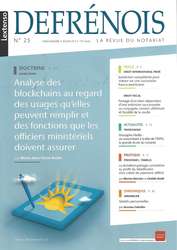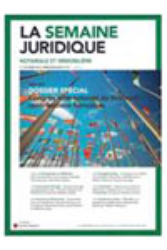June 20, 2019
Publications

Référence complète : Frison-Roche, M.-A., Analyse des blockchains au regard des usages qu'elles peuvent remplir et des fonctions que les officiers ministériels doivent assurer, in Revue Défrenois, Lextenso, n°25, 20 juin 2019, pp. 23-29.
Résumé : La blockchain est une technologie qui n'est pas, en soir, bonne ou mauvaise. Elle est plus ou moins adaptée aux fonctions qu'elle est apte à remplir. Ce qu'il faut ensuite confronter aux fonctions que l'État a dévolues aux officiers ministériels. Or, autant les fonctions de conservation et de duplication des actes gagnent à être transférées et développées dans cette technologie, autant la fonction d'élaboration des instrumentums ne peut être assumée que par des officiers ministériels auxquels l'État demande de vérifier la correspondance entre les mentions des instrumentums et la réalité des négotiums, ce que seuls des êtres humains peuvent mener et ce qu'aucune machine ne peut faire.

Updated: May 27, 2019 (Initial publication: May 13, 2019)
Publications

First of all, this working document was used as a support for an oral intervention done in French on the general topic. L'officier ministèriel est-il soluble dans la blockchain ? (Is the ministerial officer soluble in the blockchain?) at the "Club du Droit", which took place at the Conseil supérieur du Notariat on May 14, 2019, in Pars.
Consult the general presentation of the conference (in French).
Then it serves as a basis for an article to be published in the Revue Defrénois (in French).
______
Introduction & Summary.
The technical analysis of the confrontation between the tool that is the blockchain and the function that ensure these particular people who are the "ministerial officers"
For this, it is necessary to keep in mind this distinction so simple: the blockchain is a tool, a thing, a machine, an algorithm, a mechanical, mathematical power, while the ministerial officer is a human being.
This refers to the distinction that the Western legal system, whether Civil Law or Common Law, poses as summa divisio: the distinction between human beings and things. This first distinction is formulated so that we do not treat human beings as things, since they are legally qualified as "person"
For this essential distinction to remain effective, not only should we not imagine human beings as things (reduced to their bodies, for example, or reduced to mechanical acts of consumption
But technology represents more and more things with anthromophormi forms and reactions , through robots which "speak", "intelligent" machines, etc. The economic success of promoters of machines and other human-like robots, mechanical solutions presented as "intelligent", is based on forgetting the distinction between the person and things. It is certainly possible to erase this distinction from our system of thought. The difficulty is that it is the basis of Western Lawl
It is this background that is played in the practical questiond of insertion of blockchains and other technologies and the way in which the various professions must exercise their functions today. If these tools are consistent with these functions, or even improve them, professionals must welcome them without suspicion, or even participate directly in developing them. If these tools are not capable of fulfilling certain functions entrusted to these professionals, then these functions must not be inadvertently or maliciously inserted into a blockchain, whose capacity for preservation and reliability does not amount to anything, because a thing doesn't have any ability to think.
This is why we must start from the functions, by dinstinguising the technical function of conservation, duplication and elaboration of acts (I).
It seems that assuming the technical reliability of preservation and duplication acquired through the blockchain, as soon as there is a part of elaboration in the act, human intervention must step in because a machine is unfit to check the facts. Here we find the distinction between the retranscribed negotium, this retranscription never being mechanical, and the instrumentum itself, which, split from what gave rise to it, can be subjected to duplicative and conservation technologies. These technologies of conservation and duplication could be so efficient that the notions of original and copy could be questioned because of the reliability of the blockchain (II).
Thus the blockain is an effective technology on the instrumentum as documents divided from the negotium, but it can not guarantee the correspondence between the two ; it has only the reliability in the conservation, the availability and the duplication to infinity of the instrumentum, of what is extremely useful, and justifies that ministerial officers incorporate this technology. But the function of these are not limited to being agents of conservation and duplicators. We do not simply move from the copyist monk to the blockchain. The main and so precious function of the ministerial officers is to check the accuracy of the mentions of the instrumentum in relation to the reality of the negotium. This is so precious for a market economy to have this correspondance
This would be the choice of a very liquid and unsecured market (without intermediary, with the benefit of lower cost in Ex Ante and higher risk for the long term). In policy, the balance is always between security and liquidity, especillay in financial systemic policy. This was done by American Law, wich prefered low costs and high liquidity, especially for real estate loans, which were securitized by subprime mortgages. For the moment, this choice is not made in this sense by European Law, safety concern in the elaboration of the acts being preferred and the distinction between the human aptitude and the mechanical aptitude remaining. And we know that in the first system the reajustment takes the form of a general crisis, which reinjects the reality of the negotiums, lost in the instrumentums. What price are we ready to pay ?
Once this distinction is clearly made, because the elaboration of an acte mus be made bye the ministerial officer, human being invested by the State of the particular charge ensures the accuracy of the mentions of the act with the reality of people, wills, obligations and goods, it is all the more expedient for ministerial officiers to organize themselves to develop blockchain technology. Indeed, once this act has been developed reliably, ans as such deserves to be "authentic", because of the continuum between elaboration, preservation and duplication, because it is up to the ministerial officiers to draw up the deeds more incontestably reliable. It is up to them to equip themselves with the technological means of best conservation and duplication of acts elabored by them (IV).
Sur la confrontation déjà faite dans l'analyse économique de la "régulation" et la fonction notariale, v. Frison-Roche, M.-A., ....
Frison-Roche, M.A., Pour protéger les êtres humains, la nécessité éthique de la notion juridique de personne, 2018.
Anders, G., notamment dans son ouvrage central L'obsolescence de l'homme (1956), présentant l'être humain réduit à l'état de "machine désirante" par une société de pure et simple consommation. Le souci qu'il en a comme philosophe rejoint le souci qu'en avait Jacque Ellul, comme juriste, s'inquiétant de la "société technicienne" (...). Or, les machines correspondent aujourd'hui au dessin que ces auteurs du milieu du XXième siècle en faisaient. De la même façon, Alain Supiot rapporte à Kafka le souci du "machinisme" dans le fonctionnement des institutions humaines (....) ; il ne fait notamment dans son analyse de Kafka comme "artiste de la Loi" (2019).
Par exemple Supiot, A., La gouvernance par les nombres, 2015 ; Mondialisation ou globalisation ? Les leçons de Simone Weil, 2019 ; Le droit au XXIème siècle : droit, technique et écoumène (dernière leçon au Collège de France, 22 mai 2019).
Sur cette idée folle et dévastatrice qu'il faut faire davantage confiance aux machines qu'il ne faut faire confiance aux êtres humains, ce qui justifierait donc de "mécaniser" les autres humains, idée folle reprise le plus souvent par les auteurs avec entrain, v. par ex. Caprioli, E.A., La blockchain ou la confiance dans la technologie, JCP 2016. 672, n° 3.
Frison-Roche, M.-A., La disparition de la distinction de jure entre la personne et les choses : gain fabuleux, gain catastrophique, 2017.
Frison-Roche, M.-A., L'acte authentique, acte de marché, 2010.
Dec. 30, 2015
Publications

► Référence complète : Frison-Roche, M.-A., Notariat et Régulation font bon ménage, Defrénois, n° 24 du 30 décembre 2015, p. 1334.
____
► Résumé de l'article : On a parfois l'impression qu'après s'être ignorés le ministère de l'Économie et le notariat en viendraient aujourd'hui à s'affronter, "Loi Macron" interposée. Cela relèverait d'un malentendu. S'il est vrai que par la nouvelle méthode de tarification la loi du 6 août 2015 change la logique du tarif et par laquelle la conception même de ce qu'est un notaire, cela ne signifie en rien que la loi précipite la profession dans la concurrence pure et simple : elle met en place une Régulation. Très classiquement, les tarifications y sont élaborées par rapport aux coûts, méthode française admise l'Union européenne. En cela, la loi nouvelle protège la profession notariale du Droit communautaire. Plus encore, elle offre à celle-ci un nouveau rôle, plus actif que précédemment. Pour organiser une régulation, laquelle est l'opposé de la concurrence, l’État doit toujours s'allier avec les professionnels. Ils ne doivent pas manquer ce rendez-vous.
____
________
Jan. 28, 2013
Thesaurus : Doctrine
Référence complète : Serres, M., L'innovation et le numérique, conférence inaugurale du Programme Paris Nouveaux Mondes, Pôle de recherche et d'enseignement supérieur « hautes études, Sorbonne, arts et métiers », 28 janvier 2013.
Lire le résumé ci-dessous.
Oct. 1, 2010
Publications

► Référence complète : M.-A. Frison-Roche, "Acte authentique, acte de marché", JCP notarial, 2010, 1290.
____
► Résumé de l'article : l’acte authentique est souvent opposé au marché, notamment en ce qu’il appartient au droit civil, alors que le marché relève du droit économique, et qu’il n’est que la forme la plus élevée des actes probatoires, sans contact avec la logique marchande. Ces perspectives ne sont pas exactes.
Tout d’abord, l’acte authentique n’est pas un acte qui prouve, c’est l’inverse ; il dispense de prouver. Cette "anti-preuve" rend le negotium incontestable, sans que l’agent économique n’ait plus à se soucier de son exactitude, diminuant ainsi par cette sécurité purement juridique les coûts de transaction. En cela, l’acte authentique est l’acte normatif par excellence et seul le notaire, rattaché à l’État, qui diminue ainsi les externalités négatives du marché, peut lui donner ce pouvoir. Le notaire est alors le régulateur naturel des marchés ainsi intermédiés, dont il diminue les risques.
____
________